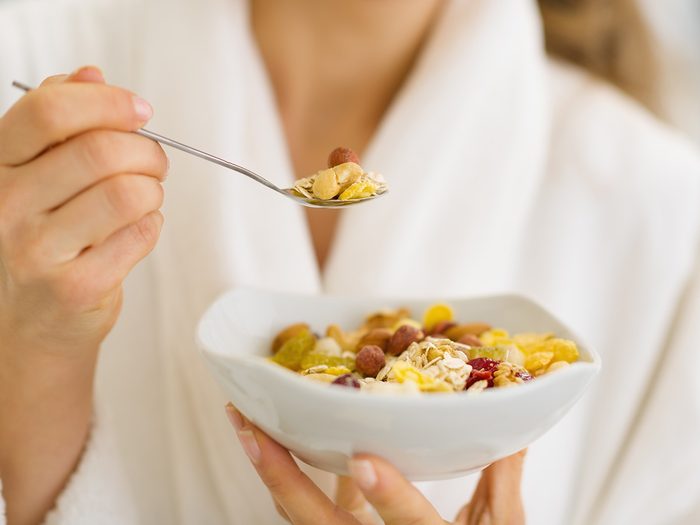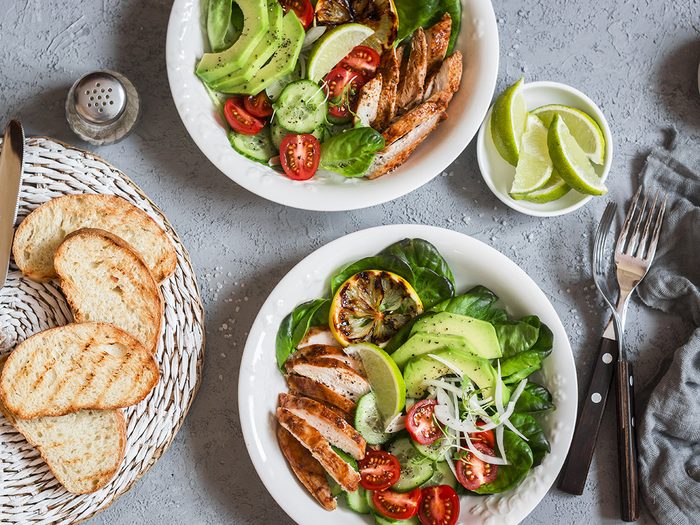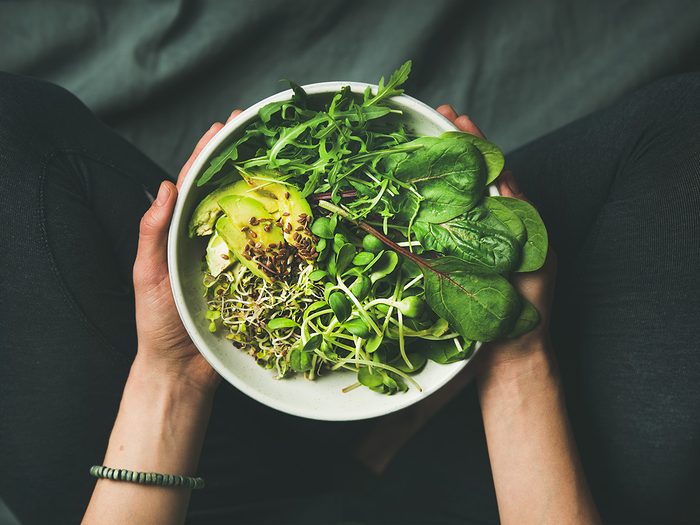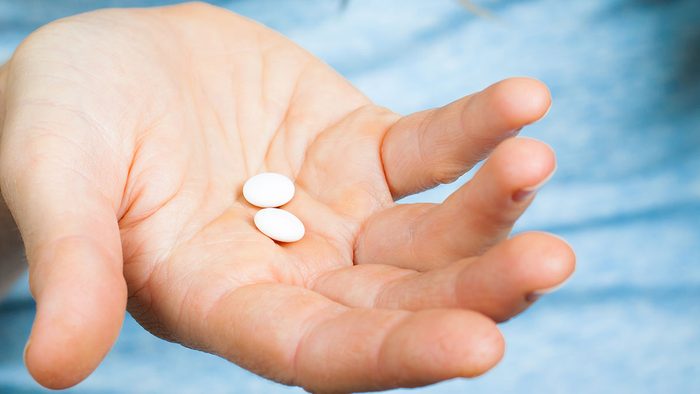
Eat foods high in magnesium
Studies indicate that a diet high in magnesium can help keep bad cholesterol in check. Dr. Carolyn Dean, heart health expert and author of Atrial Fibrillation: Remineralize Your Heart, is a firm believer in this little-touted, cholesterol buster. Magnesium works as a natural calcium channel blocker, acts as a statin to lower bad cholesterol, and improves heart health without the side-effects of cholesterol-reducing drugs, she says. When a person has a magnesium deficiency it can lead to angina, heart arrhythmia and even heart attacks, she explains. Magnesium is also great for anxiety, along with these other key nutrients.

Keep your motivation up
Keeping your eyes on the (healthy you) prize can help, says Dr. Eliot A. Brinton, president of Utah Lipid Center. “Wake up every morning with a positive thought. Ask yourself what is keeping you motivated. Maybe it’s a loved one or a personal goal you’ve set for yourself,” he says. Every day, reaffirm to yourself why you are committed to your heart health.” (Here are a few motivation hacks that will ensure you never miss a workout again.)

Watch your sugar
You probably already know that too much sugar in the diet can cause diabetes, but did you know that it also raises cholesterol? “I try to adhere to a plant-based diet, with a moderate amount of protein,” explains Dr. Manfred Sandler, a cardiologist at CardioVascular Group, in Atlanta. “I definitely try to avoid white, starchy carbohydrates, and processed sugars. This type of diet not only keeps your cholesterol and triglycerides in order, it can help keep your weight down,” says Sandler. (Here are the signs you’re eating too much sugar.)

Eat a high-fibre diet
Soluble fibre can reduce low-density lipid cholesterol, aka the LDL or “bad cholesterol, your doctor keeps warning you about. “Choose foods that are high in fibre, such as whole grains, legumes, vegetables, fruits, and nuts,” suggests Dr. Brinton. The Mayo Clinic recommends aiming for five to ten grams daily.

Stay active
If you think you have to be a gym rat to lower cholesterol, think again. Dr. Howard Eisen, chief of the Division of Cardiology at Drexel University College of Medicine, uses a stationary bike, to stay active. “I encourage my patients to walk for two miles in 45 minutes. Even walking around the mall in cold winter months, can do the trick,” he says. Aim for at least two and a half hours of aerobic exercise every week. (Need some fitness inspo? Here are amazing Canadian fitness experts to follow on Instagram.)

Choose the right statin
When it comes to cholesterol-lowering medications, it’s important to know your options, says Dr. Brinton.”There are seven statins, and each one is different. If you are doing poorly on one, ask your doctor about switching. Remember that he or she can’t help you fix a statin-related problem, unless you speak up,” he says. Statins vary in cost, effectiveness and side effects. According to the Mayo Clinic, statin-related problems include digestive issues, muscle pain, and fuzzy thinking.

Say no to second helpings
If you marvel at your cardiologist’s svelte form, this may be why: When it comes to food, portion size counts. If you routinely go back for more of anything, other than veggies sans-dressing, you may be eating too much, and upping your cholesterol (and weight) to boot. “Don’t eat more calories than you need. The best way to do that is to watch portion size, and don’t have second helpings. If you eat too much, you will never maintain a healthy, low weight, regardless of how much you exercise,” says Dr. Brinton.

Consider going vegan
When it comes to lowering cholesterol, if you love vegetables, you may be halfway home. Vegetarian and vegan diets are more than just hype, says Dr. Shalini Bobra, a cardiologist with White Plains Hospital Medical and Wellness in Armonk and the Montefiore Einstein Center for Heart and Vascular Care. “With all the new research on how a healthy diet can reverse the threat of heart problems, I recommend, and follow, a diet rich in plant-based, unprocessed foods. These have been shown to lower cholesterol, reduce necessary medications, and leave patients feeling better,” says Bobra.

Stop smoking already
As reported in 2010 in the Journal of the American Medical Association (JAMA), less than two percent of doctors smoked cigarettes… and probably, even less are smoking now. The sad truth is, doctors see the damage cigarette smoking does every single day. According to WebMD, cigarette smoking lowers HDL, the good type of cholesterol you want, and increases your overall risk of coronary artery disease. It is quite possibly the number one worst thing you can do to your health (not to mention your looks, your teeth, and your body odour). “Even one cigarette a day increases heart disease and stroke risk,” says Dr. Brinton.

Go Mediterranean
A diet high in omega 3 fatty acids is many cardiologists’ secret weapon against high cholesterol. Following a food plan, such as the Mediterranean diet, is a great way to ensure you get plenty of this essential fatty acid in the correct ratio to omega 6 fatty acid, another health booster. According to doctors at the University of Maryland Medical Center, omega 3s raise good cholesterol, reduce inflammation, and lower the risk of heart disease, cancer, and arthritis.

Cultivate a close relationship — with your doctor
Doctors need doctors, too, and recommend you find one you feel comfortable with and trust. Stick with them, so they get to know you over time. This type of relationship breeds a level of communication, which may help support your quest to lower cholesterol, year after year. “I have a fabulous internist. We have a great partnership, focused on my individual needs, and health issues,” explains Dr. Stacey Rosen, professor of cardiology at the Zucker School of Medicine at Hofstra/Northwell and co-author of Heart Smart For Women: Six S.T.E.P.S. in Six Weeks to Heart-Healthy Living.

Get enough sleep
Dr. Brinton recommends trying to sleep at least six hours per night. “Since lack of sleep is a common contributor to heart disease and stroke, if you’re having trouble sleeping soundly, talk to your doctor about how to help fix that,” he recommends. Dr. Rosen agrees. “I find I need more sleep as I’ve aged, and try to focus on my sleep hygiene habits, which means no electronic devices in bed, cool temperature in the house and a minimum of seven-to-eight hours of sleep each night,” she says.

Reduce your stress level
Research reported by Healthline indicates that stress can raise bad cholesterol levels. Stress can impact upon your ability to acquire and maintain healthy, cholesterol-busting habits. It can also trigger an adrenaline-triglyceride response, which may uptick bad cholesterol numbers. “High-stress levels increase the risk of heart disease and stroke, even if your cholesterol is well-controlled,” says Dr. Brinton. Good stress busters to try? Meditation, yoga, physical exercise, and friendship.

Know your family history
Atlanta-based integrative and functional medicine physician Bindiya Gandhi says it’s important to be aware of genetic factors, such as family history and health issues, which might impact upon those numbers. “Often, we forget that genetics can play a part in cholesterol numbers, especially in patients who follow strict lifestyle modifications and still have abnormal cholesterol levels.”

It’s about more than lifestyle habits
Some medications, such as oral contraceptive pills, and medical conditions, like hypothyroidism, also can elevate total cholesterol levels, Dr. Ghandi says. Make sure your doctor has your whole health profile top of mind when you are analyzing those numbers month-by-month, especially if you are doing everything you can to reduce your cholesterol, or already are taking a statin.

Don’t forget your triglycerides
Even if your cholesterol numbers are in the OK range, your doctor should be checking your triglyceride levels as part of your cholesterol panel. “You want to keep your total triglyceride levels below 100,” says Dr. Ghandi. Patients who are prone to high triglycerides need to limit their carbohydrate consumption and avoid high fructose corn syrup, artificial sweeteners, and honey. “I recommend niacin, CoQ10, and high-quality omega 3 fatty acid supplementation,” says Dr. Ghandi. She also likes red yeast rice for elevated lipid levels, which is what traditional statins are made of.
Next, learn the health secrets women over 50 should know.
